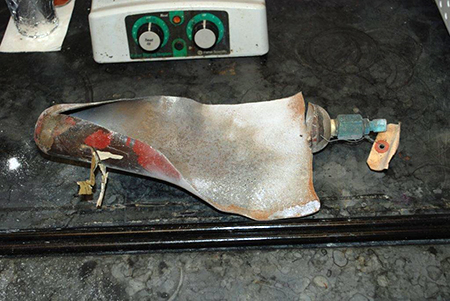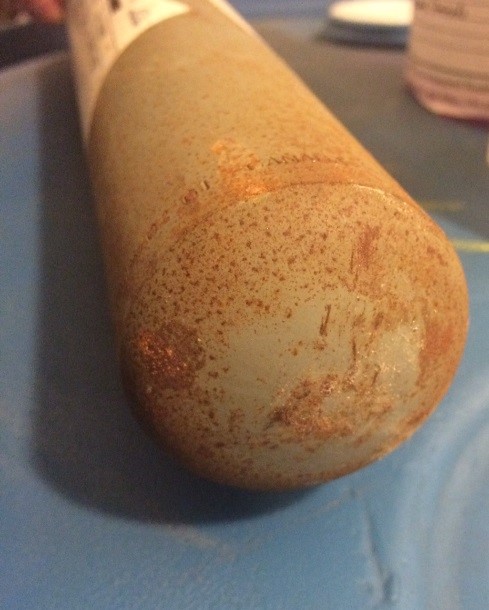Time-Sensitive Compressed Gases
 Figure 1: Purdue University, 2011: An exploded 30-year old HF Cylinder
Figure 1: Purdue University, 2011: An exploded 30-year old HF Cylinder
Special attention must be paid when using and storing certain corrosive compressed gases, as over time they can become extremely hazardous.
Time-sensitive gases include:
- Hydrogen Fluoride, Anhydrous (HF)
- Hydrogen Bromide, Anhydrous (HBr)
- Hydrogen Sulfide, Anhydrous (H2S)
- Hydrogen Cyanide, Anhydrous (HCN)
- Hydrogen Chloride, Anhydrous (HCl)
These gases slowly react with moisture, causing corrosion of cylinder materials and forming hydrogen gas. The excess hydrogen pressure and corrosion then cause the cylinder to fail, and an explosion like this or this is likely. Figure 1 is an example of an exploded HF cylinder that occurred in 2011 at Purdue University.
The corrosive and toxic nature of these gases, as well as the high flammability of hydrogen gas pose additional hazards. However, good chemical hygiene can prevent such accidents.
Depending on the cylinder manufacturer, HF and HBr have a shelf life of less than 2 years. Periodic pressure testing is also recommended. Cylinders containing these gases should be dated immediately upon receipt and disposed before the manufacturer’s recommended shelf life. Cylinders of this type that are old or of an unknown age can cost up to $2,500 in additional shipping fees for disposal. Note that these fees may be passed on to the responsible department.
 Figure 2: Please note the corrosion on the HBr Cylinder in the photograph above, IUPUI, 2015 Figure 2: Please note the corrosion on the HBr Cylinder in the photograph above, IUPUI, 2015
To avoid problems, only order these in the smallest amount that you need. These gases should be stored in a cool, dry location away from incompatible materials. They should not be stored in acid cabinets or other areas where external corrosion can occur as seen in Figure 2. Follow all manufacturer warnings and instructions for handling, storage shelf-life and disposal.
|